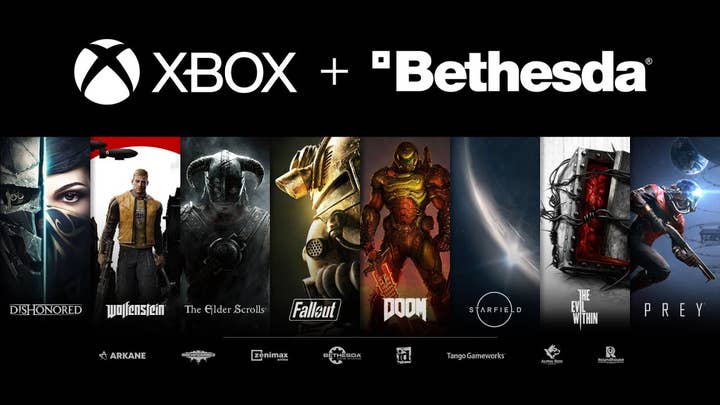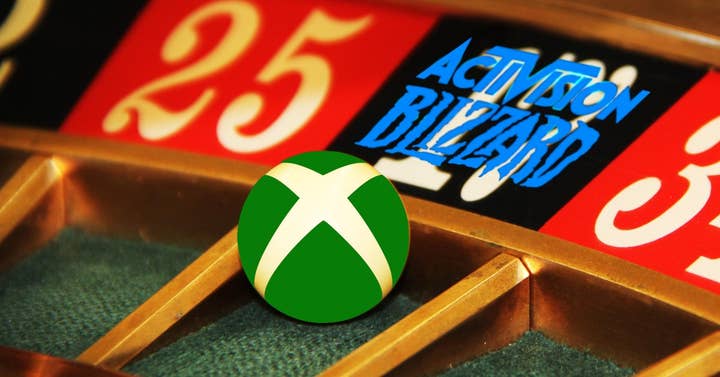Buying Activision Blizzard is the industry's biggest gamble | Opinion
The sheer scale of Microsoft's acquisition shouldn't distract from how risky and difficult it will be - and some major questions won't have answers for years
The announcement that Microsoft is to buy out Activision Blizzard for almost $70 billion marks a dramatic change to the competitive landscape of the games industry, and as such, it's going to be quite a long time before the dust settles fully and all of the questions raised by this acquisition are settled.
Some of the more obvious questions may have answers in a matter of months -- whether Call of Duty will become a platform-exclusive, for example (Phil Spencer has already hinted that he'd prefer the franchise to remain multiplatform), or what will happen to embattled Activision Blizzard CEO Robert Kotick after the buyout completes.
Other major questions will take a little longer to settle, such as the role that King -- Activision Blizzard's mobile gaming operation -- will play, or how Microsoft will set out to tackle the serious problems with harassment, misconduct and mistreatment of employees that have been revealed at the company over the past year.
Two of the biggest questions, however, will take several years to really pan out, because they're questions about what happens next -- both from Microsoft's side and in terms of the broader implications for the industry -- and those are very difficult questions to answer given that we're into uncharted territory here.
There's really no roadmap to look at in terms of how this kind of acquisition pans out -- we don't know how a deal this big works in the games business because it's never happened before
Firstly, how will Microsoft manage this acquisition and what practical impact will it have on the competitiveness of Xbox and Game Pass? Or perhaps even more broadly, what will Microsoft's gaming division even look like five or ten years down the line, after the integration of such an enormous company alongside Microsoft's existing studios and staff?
Secondly, what will the acquisition do to the rest of the industry -- most notably Sony, whose options for a response to this major competitive threat have been discussed to some extent this week, but which finds itself facing very tough decisions given that it's a much smaller company than its giant rival?
Each of those questions was also floated a couple of years ago when Microsoft bought Bethesda, but they're both made far more urgent and complex due to the sheer scale of the Activision Blizzard deal. The $68.7 billion price tag doesn't just make this a huge deal by games industry standards -- which it is, being almost an order of magnitude larger in cash terms than the industry's biggest acquisitions of the past -- but also an enormous deal by Microsoft's standards. It's three times the amount the company spent to acquire LinkedIn in 2017, which was formerly their biggest-ever deal; other major Microsoft acquisitions like Skype and Nokia are tiny by comparison.
The price tag is only one facet of the scale of the deal, though; Activision Blizzard is also a huge company in other respects, with roughly 10,000 employees and a large number of internal studios, several of which would be pretty decently-sized companies in their own right.
There's really no roadmap to look at in terms of how this kind of acquisition pans out -- we don't know how a deal this big works in the games business because it's never happened before, and we don't know how Microsoft handles acquisitions of this scale because it's never done one before.

There are some very imperfect proxies we can look at to try to get some idea of how the deal will proceed; perhaps the closest match we've got is the acquisition of 20th Century Fox by Disney a couple of years ago, but the acquisition of a media production and broadcasting company by another media production and broadcasting company is a much more straightforward deal with far more direct and clear synergies, in many regards, than Microsoft's acquisition of Activision Blizzard.
The scale and complexity of what's being attempted with this acquisition -- with the full complexity only really starting at the point where the deal itself closes -- makes it into a genuinely risky proposition. There's an obvious temptation to read it as a major competitive broadside aimed at Sony and thus to present the deal as a huge coup for Microsoft, but that obscures just how difficult the task ahead for Microsoft actually is, and the many ways in which an acquisition like this can actually fail, ultimately delivering far less value than the acquiring company was hoping for.
Activision Blizzard's massive problems with its internal studio culture, management, and HR are well documented, and that doesn't just go away because someone else owns all the shares
In truth, mergers and acquisitions fail to deliver real value all the time; we need look no further than close-to-home examples, like EA's various studio acquisitions or Microsoft's own expensive buyout of Rare, for instances where acquisitions ultimately underdelivered on expectations. Such failures can be due to a cultural mismatch, poor management of the merger, badly calibrated expectations on either side, or a host of other reasons ranging from internal politics to simple bad timing. The fact that this is such an enormous deal doesn't make it any less likely to encounter those problems; it just makes the stakes higher.
Moreover, neither of these companies are beginning this acquisition from an ideal starting point. Microsoft is still in the process of really trying to get its first-party game studios off the ground, so it's not like there's a well-established studio system and product pipeline that Activision Blizzard's various studios can be integrated with. And Microsoft is still in a process of integrating its last major gaming acquisition, Bethesda, which remains in the "hugely promising" pile regarding its contribution to the Xbox platform and is unlikely to actually start delivering major first-party titles for quite some time.
Attempting to rapidly build up a studio system that could rival Sony's output was always going to have some growing pains, and a few years when Microsoft was running a huge studio operation while still having a relatively weak product pipeline was inevitable, but adding an enormous third-party publisher to the mix hugely multiplies the complexity of those problems.

As for Activision Blizzard, well, massive problems with its internal studio culture, management, and HR are well documented, and that doesn't just go away because someone else owns all the shares. The likelihood that the acquisition will see the departure of a layer of Activision Blizzard's top management -- most notably Kotick -- might help the company with the fixing and healing process, but the reality remains that Microsoft is buying a wounded company. IP like Call of Duty remains tremendously valuable, but the work that's going to need to happen to make Activision Blizzard's internal studios into functional, effective, well-managed studios remains enormous and is only complicated further by needing to happen alongside the already tricky task of transitioning to the new management structure.
All of which is to say that while this is absolutely the most aggressive commercial move any company has ever made in the gaming space, it's far from being a slam-dunk certainty. It's possible, even likely, that in ten years' time we'll see this as having been a grand turning point in the battle for console and streaming supremacy -- but it's certainly not impossible that things go a very different direction and we instead find "remember when Microsoft paid all that money for Activision Blizzard..?" being both setup and punchline for a gag about big-spending hubris.
Microsoft buying Activision a couple of generations ago would have been a devastating blow to PlayStation
The fact that Microsoft's acquisition isn't a guaranteed success, however, is cold comfort for Sony, for whom this is the nightmare it has feared since Microsoft first started trying to use its limitless cash hoard to buy its way into the games business twenty years ago. The purchase of Bethesda was a shot across the bows for Microsoft's rivals, but not in itself a major departure from the standard industry playbook for such deals -- a relatively small, high-prestige publisher with a library of core gaming IP was pretty much the ideal acquisition to jump-start first-party studio ambitions.
Activision Blizzard is something entirely different. It's one of the biggest publishers in the industry -- more often than not in recent years it's been the biggest third-party publisher by market cap. Buying it will not only give Microsoft a major new set of studios to produce Xbox and Windows games, it will also expand Microsoft's reach into new segments like mobile, and fundamentally change Microsoft's games business itself. Nobody has ever taken an asset this big off the board before, and Activision Blizzard being absorbed into Xbox means that ultimately, a lot of Microsoft's games division will be Activision Blizzard -- although given recent events the company will no doubt be very careful about filtering which aspects of Activision Blizzard's culture survive through the deal.
Sony will be perturbed by this deal, but also keenly aware of the complexity of what Microsoft is undertaking and the risks involved, and thus wary of making any rushed or panicked moves in response. Moreover, Sony's own strategy has, in recent years, leaned more and more heavily on first-party exclusives from its own very impressive set of internal studios, making the PlayStation business more "Nintendo-like" than it's ever been before.
It's still nowhere near the level of first-party dominance we see on Nintendo systems, but the shift is very significant -- very few of the biggest games on PlayStation were Sony first-party titles up until the second half of the PS3 era, but first-party games are now the pillars that hold up the whole platform. Consequently, Sony is a little less vulnerable to a rival buying up third-party publishers than it used to be. Microsoft buying Activision a couple of console generations ago would have been a devastating blow to PlayStation, but all Sony's work on building up its first-party exclusives now cushions that blow significantly.

It's still reasonable to imagine that some defensive acquisitions might be being explored by Sony -- it seems far more likely that the Activision Blizzard deal is the end of a Microsoft spending spree, rather than the beginning of one, but Sony will still be mulling over whether there are any third-party publishers it really doesn't want to see taken off the board by its rival. There's some low hanging fruit there -- Sony could probably put together a deal to acquire a company like Capcom or Square Enix relatively easily, perhaps even Ubisoft -- but we shouldn't expect to see Sony rush to make any big deals or change its overall competitive approach significantly just in order to respond to the Activision Blizzard buyout.
The way Sony has built up its studios so far has been slow, cautious and careful, and while there have been some misses, generally it's done a great job of maximising cultural fit and keeping its studios doing great work post-acquisition. That issue of cultural fit is a huge question mark over Microsoft's acquisition, but Microsoft is a multi-trillion dollar company which can survive even a deal this big going south.
Sony is a smaller company by orders of magnitude, and if it makes billion-dollar deals they absolutely need to succeed; it simply cannot afford to take the kinds of risks that Microsoft can happily gamble on. This isn't to say that a major deal like buying Square Enix is impossible, but if it does happen, it'll reflect a huge degree of confidence on Sony's part over its ability to fit that company into the firm's existing line-up of studios and products.
Microsoft's buyout of Activision Blizzard ups the stakes in the console and streaming battles significantly, and may be a signal of even more major deals to come down the line -- but we shouldn't assume that such a huge price tag brings with it any guarantee of success, and the questions around how this deal will work out won't be answered for several years to come. Expectations that Sony will now be forced to respond in kind should also be tempered; that response will also take quite a lot of time to formulate, and Sony will not be keen to enter an arms race it knows it can't win at risk of upsetting the balance of the studio system it has spent more than a decade building.
This acquisition changes the landscape -- but until the tremors cease and the dust settles, it won't be entirely clear what the new landscape looks like.
Basis of lead image by Greg Montani from Pixabay









